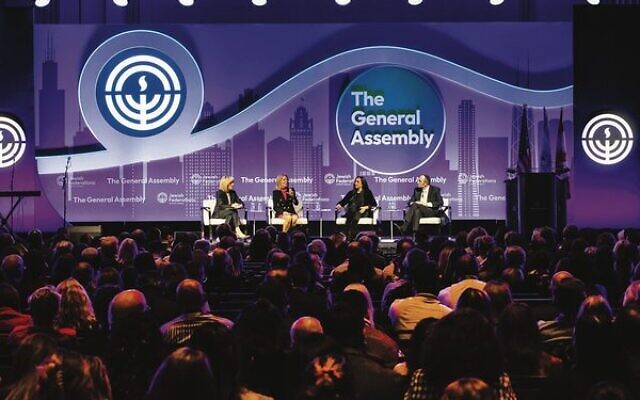President Herzog: Vote should be ‘respected’
'The results may or may not be to your liking, but the vote of the Israeli people should be respected.'

The Israeli election preoccupied the 1300 attendees at the Jewish Federations of North America annual convention in Chicago last week.
Many of them will have to contend with the impact of the election on their communities. Already, how to direct funding toward Israel issues and how to navigate growing criticism of the Israeli government have been vexing questions for local federation leaders. A far-right government helmed by Benjamin Netanyahu, whose values are at odds in many ways with those of many American Jews, could make the situation more complicated.
“I am aware of the questions posed in many Jewish communities around the world about the outcome of the elections,” Israeli President Isaac Herzog said in a prerecorded message to conference attendees. “The results may or may not be to your liking, but the vote of the Israeli people should be respected.”
Few at the convention would speak on the record about the election and the potential for it to install into the government right-wing provocateur Itamar Ben Gvir. But in hallway conversations, many said they were alarmed by Israel’s rightward lurch and by the seeming embrace by voters of all ages of Ben Gvir’s anti-Arab activism.
For federation leaders, the election results could present practical challenges. Will local Jews choose to donate to support a country whose leadership is abhorrent to them? Many local leaders said they had been thinking about what they would do after the election results are clear.
“There’s a conversation about Tuesday night, and a conversation about Wednesday, and a conversation about 44 days after that,” said Jeremy Burton, who heads the Jewish Community Relations Council of Greater Boston.
Burton was referring to the complicated post-election process to form a government. If Netanyahu meets that threshold, he would formalise Ben Gvir’s role in the new government – or his failure to do so would become the newest addition to a long history of alliance promises that Netanyahu has reneged upon when better political options presented themselves.
A broken promise by Netanyahu is a best-case scenario, according to many people at the conference who would speak only off the record. They say that if Benny Gantz, the Defence Minister who is running as the leader of the National Unity party, exceeds the tally by Ben Gvir and Bezalel Smotrich, who are running together in the Religious Zionism alliance, they would expect Netanyahu to drop the extremists and instead create a more centrist government that would be palatable to American Jews.
Another desired outcome: a continued stalemate, in which no candidate gets a mandate to form a government. In that scenario, Yair Lapid, the centrist current Prime Minister, would continue to run the country.
That’s also the best-case scenario for the Biden administration, according to people at the conference who are in touch with the White House. They said there are live discussions about how the administration would handle Ben Gvir’s presence in an Israeli government and that a continued caretaker government would be preferable.
Even a panel discussion about Israel’s elections offered little in the way of open discussion. Its moderator, Miryam Rozensweig, the president and CEO of the Milwaukee Jewish Federation, said she and her colleagues expect to hear from local donors no matter the outcome.
JTA

comments